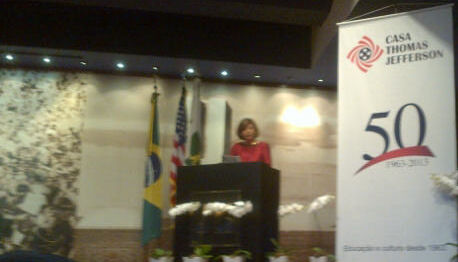People overestimate ability to learn and maintain second languages. An interesting article explaining how American Hispanics are losing their Spanish tracks with my experience. Sic semper erat, et sic semper erit. People say we should learn foreign languages. Which one? Learn Latin.
I feel that I have something special to add to the language debate. I am a non-linguist with lots of language experience. At one time I SPOKE fluently four languages, although never at the same time. I know that most people who think they can speak more than one foreign language are fooling themselves. Such people exist, but they are rare. I don’t believe that average people can maintain practical professional level competence is even one foreign language unless they use it on a daily basis. Daily basis.
This presents Americans with a dilemma that people from non-English speaking countries do not face. People from other languages know that English is essential if they want careers in science or international business. It makes perfect sense to require English in primary or secondary schools. English is the world language; the only one that is universally useful. Even if individuals never leave their own countries, English will often still be an advantage for them. No other language is like that.
What does an American do? We say you should study Chinese. Fine. This works if you plan to go to China. If you plan to do business with Chinese businesspeople you encounter in Europe they and you will have to speak English. What about Spanish? North of the Pyrenees, it is not much use in Europe and almost no use at all anywhere else except in Latin America. Half of the South American population is Portuguese speaking. Portuguese speakers tend to understand lots of Spanish, but it is a one-way street. As a Spanish speaker, most Portuguese will go over your head. Arabic? Okay in the Middle East, but locals may not understand your dialect and will probably default into English.
I believe that you should learn the language of a country if you plan to live or do business there. I have done that myself. I also understand that learning another language is great intellectual exercise. We Americans should not remain stubbornly monolingual just because our language is the one used throughout the world. But what should be our FIRST language. If we are talking about an American kid with no plans to go to any particular place in the world, what language should he/she learn?
Latin. Kids should learn Latin first. It is true that nobody outside the Vatican actually speaks Latin, but Latin is the basis of all Romance languages. It is much easier to learn French, Italian, Spanish, Portuguese and even Romansh and Romanian if you have a Latin base. Latin has had a big influence on our own English language and has infiltrated almost all the world’s major languages. But there are other reasons to learn the language of Caesar, Cicero, Augustine, Bacon and Spinoza.
Latin literature is unusually rich and varied. Many of the classics of Western Civilization were written originally in Latin, starting with the Romans and continuing on for more than a thousand years after the fall of the great Empire. Isaac Newton wrote in Latin, hence his Philosophiæ Naturalis Principia Mathematica.
The study of Latin implies the study of Latin literature and that is something of lasting value. I studied Latin many years ago. I can no longer read Latin w/o great difficulty. I cannot say I have any facility left at all. As I wrote up top, maintaining a language is very difficult. But my English vocabulary is superb, partly due to my Latin experience, and I still recall much of the literature I imbibed only semi-willingly when studying the ancient language.
I think we make a big mistake when we demand that everything we teach or learn should be relevant to our immediate needs. This almost guarantees that we are surrendering the bigger picture, the long term. IMO, we give in too readily to the auto-erotic impulse of letting students study themselves. A lot of this started in the 1960s. Schools gave up the classics to concentrate on various self-esteem studies. How did that work out? Instead of reaching toward things of lasting common value, we explored differences that didn’t make much difference then and today don’t make any difference at all.
I don’t expect a Latin Renaissance. Too bad.


